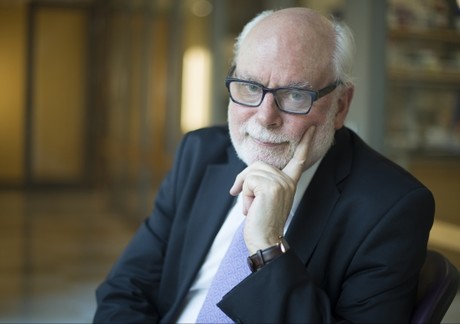Nobel Laureate to join UNSW

Nobel Laureate, Sir Fraser Stoddart, is set to join the School of Chemistry within the Faculty of Science at UNSW Sydney.
Sir Fraser will join the university in a part-time capacity and plans to spend his appointed three months each year in Sydney, beginning in the period January through March 2019. He will establish a team at UNSW to realise the vision of his ‘New Chemistry’ initiative.
Sir Fraser was jointly awarded the Nobel Prize in Chemistry in 2016 along with Jean-Pierre Sauvage and Bernard Feringa “for the design and synthesis of molecular machines”.
Molecular machines are either natural or synthetic molecules that convert light, electrical or chemical energy into mechanical motion. These tiny creations are approximately 300,000 times thinner than the diameter of a strand of hair.
While these smallest-of-all machines have a role to play in revolutionising chemical synthesis and catalysis, they will also impact various aspects of materials science: they have already led to the production of scratch-resistant polymers for coating onto the surfaces of cell phones, as well as being introduced into lithium-ion batteries producing beneficial effects on their lifetime usage, believes Sir Fraser.
Dean of UNSW Science Professor Emma Johnston said she was thrilled to be welcoming Sir Fraser to the faculty: “In addition to his Nobel-prize-winning research, Sir Fraser has also made exceptional contributions to the fields of carbohydrate and second-sphere coordination chemistry.”
Both have led to start-up companies, one which has just launched a product line of anti-ageing creams onto the market and the other which is exploring environmentally friendly gold extraction methods. Sir Fraser is also conducting research into creating functional systems using energy inputs and the development of batteries and supercapacitors for energy storage.
Alongside his research, Sir Fraser will teach into undergraduate courses in chemistry at both first and higher year levels, and help to inspire our next generation of scientists.
In 2007, Sir Fraser received a knighthood from Queen Elizabeth II for his services to chemistry and molecular nanotechnology. “I am excited at the prospect of being able to spend a considerable amount of time each year in Australia at a world-class university such as UNSW Sydney,” Sir Fraser said.
“The New Chemistry initiative will open doors in materials science across different length scales. In terms of function, what was science fiction a few years ago will become reality during the next decade or two.”
UNSW President and Vice-Chancellor Professor Ian Jacobs said, “I am delighted by Professor Stoddart’s appointment. Less than 1000 people have been awarded a Nobel Prize since the awards first began in 1901, and there have only been 15 awarded to Australians. To have such an outstanding Nobel Laureate choose to work at UNSW is incredibly exciting and a reflection of the quality of this university,” Professor Jacobs said.
Head of the School of Chemistry Professor Scott Kable said: “Professor Stoddart is an incredible researcher and teacher. He has trained over 450 postgraduate students and postdoctoral fellows and his 1000-plus invited seminars and lectures are legendary and inspiring for undergraduate and postgraduate students alike.
“He also told me that he wants to mentor and inspire early-career researchers. I look forward to having him in the school and interacting with our many young researchers, both staff and PhD students.”
The New Chemistry initiative at UNSW will become a central part of a UNSW Institute under the UNSW Future Scheme focusing on Systems Chemistry and Synthetic Biology. Sir Fraser will also aim to secure significant industry funding to develop his cyanide-free gold processing technology at UNSW in partnership with Australian mining companies.
Sir Fraser is presently a Board of Trustees Professor of Chemistry and head of the Stoddart Mechanostereochemistry Group in the Department of Chemistry at Northwestern University in Illinois, and has a research laboratory supporting young researchers at Tianjin University in China.
How librarians can help maintain image integrity
By sharing best practice and providing useful resources, librarians can support researchers in...
Winners announced for 2025 Australian Museum Eureka Prizes
Now in their 35th year, the Australian Museum Eureka Prizes continue to highlight some of the...
"Damning" review of Forensic Science Queensland released
The review of the troubled forensic service provider reveals unreliable results,...



